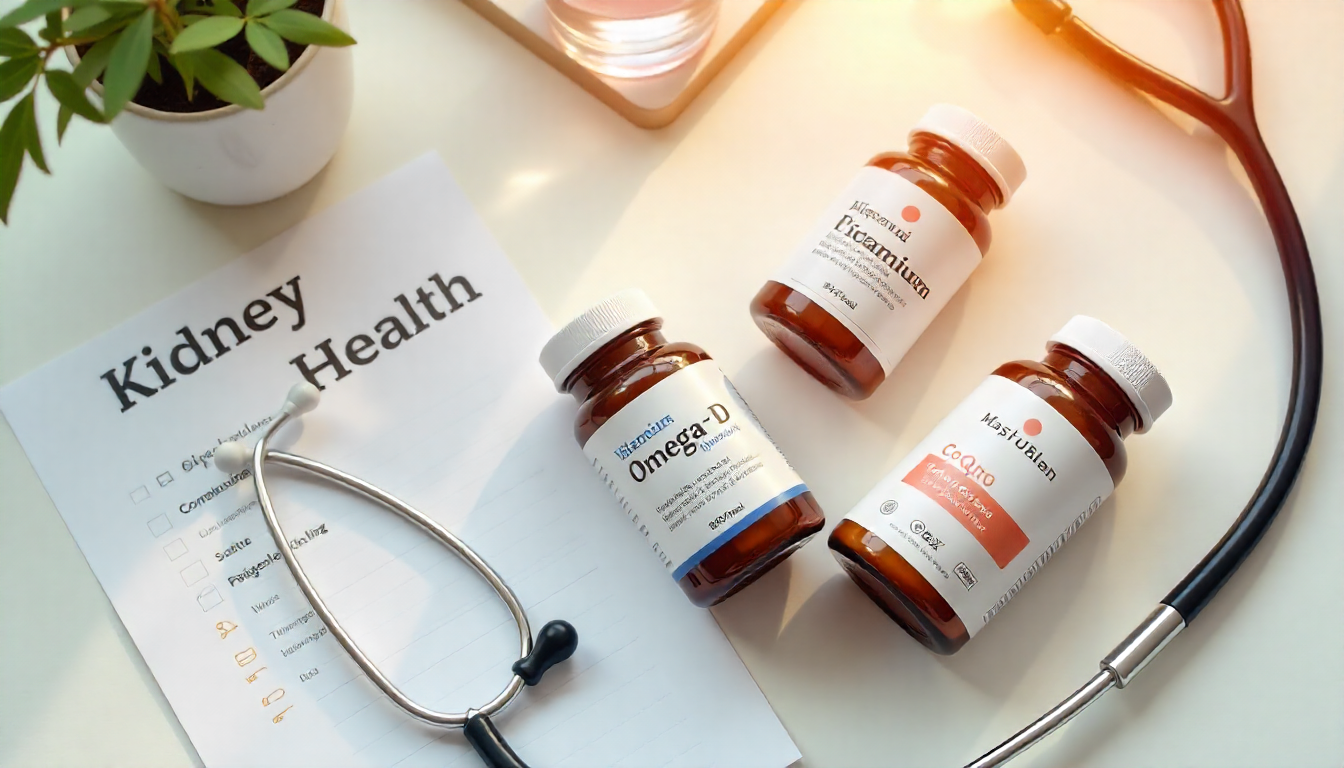Introduction
Your kidney health plays a vital role in filtering toxins, balancing fluids and electrolytes, and regulating blood pressure. In 2025, advances in nutritional science and expert physician guidance have shaped a new wave of doctor-recommended supplements for kidney health. If you’re looking to support kidney function, reduce oxidative stress, and promote long‑term wellbeing, this guide—backed by expert insights and clinical data—is for you.
Why Focus on Doctor‑Recommended Supplements for Kidney Health?
Kidney function naturally declines with age, chronic conditions like diabetes, or medication use. In 2025, doctors recommend supplements that:
- Reduce oxidative damage in nephron tissues
- Support filtration and detoxification pathways
- Provide essential vitamins and minerals often low in CKD (chronic kidney disease)
- Complement a kidney-friendly meal plan and healthy lifestyle regimen
By combining targeted supplements with kidney-healthy nutrition and physical activity, you can reduce risk factors and maintain renal function longer.
Core Doctor‑Recommended Supplements for Kidney Health
1. Omega‑3 Fatty Acids (Fish Oil) – A Top Kidney Health Supplement in 2025
- Reduces inflammation, supports cardiovascular health, and may slow progression of CKD.
- Typical dose: 1,000–2,000 mg EPA/DHA daily.
- Doctor Mahreen Khan, a nephrologist in Faisalabad, emphasizes: “High‑quality, purified fish oil can reduce proteinuria and blood pressure in CKD patients by modulating inflammatory cytokines.”
2. Vitamin D3 + K2 – Essential Kidney Health Supplement for 2025
- Promotes calcium-phosphorus balance and reduces the risk of kidney calcification.
- Clinical data support the combined use of D3 and K2 in CKD patients with deficiencies.
- Complement with: Best Vitamin D Supplements in the United States.
3. Magnesium
- Helps regulate blood pressure, supports energy production, and neuromuscular function.
- Often low in CKD due to dietary restrictions; supplementation can help.
- Typical dose: 200–400 mg elemental magnesium daily (depending on kidney function).
4. CoQ10 (Ubiquinol)
- Potent antioxidant that improves mitochondrial function; evidence for improved GFR and reduced oxidative stress.
- Doctor‑recommended dose: 100–300 mg/day.
5. N‑Acetyl‑L‑Cysteine (NAC)
- Precursor to glutathione, the body’s master antioxidant.
- Studies show a reduction in oxidative DNA damage and an improvement in renal markers.
- Dose: 600 mg twice daily.
6. Alpha-Lipoic Acid (ALA)
- Dual‑action antioxidant and chelator; supports glycemic control and neuropathy.
- Particularly beneficial for diabetes-related CKD.
- Typical dose: 300–600 mg/day.
7. Probiotics with Renal‑Friendly Strains
- Gut–kidney axis: “good” bacteria help eliminate uremic toxins.
- Look for strains like Bifidobacterium bifidum, Lactobacillus plantarum.
- Doctor Mahreen advises: “A renal‑specific probiotic can aid in reducing creatinine and blood urea nitrogen (BUN) levels.”
8. Curcumin (Turmeric Extract)
- Anti‑inflammatory and antioxidant; protects renal cells from ischemia and hyperglycemia.
- Enhanced absorption formulas are preferred—doses of 500–1,000 mg/day.
9. Resveratrol
- Polyphenol with anti‑aging and anti‑inflammatory properties; helps prevent fibrosis.
- Dose: 150–500 mg/day.
10. Beetroot Extract
- Rich in nitrates—can improve blood flow and lower renal blood pressure.
- Doctor‑recommended dose: 500 mg daily or 100% beet juice, 2–4 oz/day.
Integrating Supplements with Diet & Lifestyle
- Kidney‑Friendly Diet: Follow an eating plan low in sodium, phosphates, and processed proteins. See guides:
- Kidney‑Friendly Meal Plan
- Worst Foods for Your Kidneys
- Foods That Help Repair Kidneys and Liver
- Is Lemon Water Good for Your Kidneys?
- Hydration & Kidney‑Health Drinks: Stay well‑hydrated and include antioxidant-rich options; refer to Kidney Health Drinks.
- Avoid Excessive Iron: Too much iron can strain renal function; know the Best Time to Take Iron Supplements.
Expert Opinion from a U.S. Board-Certified Nephrologist
According to a U.S.-based board-certified nephrologist, maintaining kidney health in 2025 begins with sound lifestyle choices. This includes eating a healthy, balanced diet, drinking plenty of water, and controlling blood pressure. Supplements should not be used as a substitute for a healthy lifestyle; instead, they should be used to fill nutritional gaps.
The specialist advises obtaining necessary blood testing before starting any renal health supplements, including:
- Levels of electrolytes
- Rate of Glomerular Filtration (GFR)
- Levels of calcium, magnesium, and phosphate
Aggressive herbal detox mixtures are strongly discouraged by the nephrologist because they may do more harm than good. Choose doctor-approved, pharmaceutical-grade vitamins that are safe for renal function instead.
Trusted Resource for Kidney Health Supplements 2025
To dive deeper into CPR (Chronic Kidney Disease) nutrition and science:
National Kidney Foundation – a trusted, research‑based resource offering meal plans, supplement guidelines, and CKD patient advice. For comprehensive evidence-based support, visit:
National Kidney Foundation – Kidney Diet & Nutrition
Kidney Health Supplements 2025: Frequently Asked Questions
1. Can supplements cure kidney disease?
CKD cannot be cured by supplements. However, doctor-prescribed supplements can improve indicators such as proteinuria and GFR, reduce oxidative stress, and help maintain kidney function.
2. When should I start taking supplements for kidney health?
Start as soon as you notice symptoms such as hypertension, elevated creatinine or BUN, or decreased GFR. If you’re at risk (e.g., due to diabetes or a family history), consider starting even earlier. Always review your lab results and consult your doctor first.
3. Are there any side effects?
Particularly in CKD, over-supplementation of fat-soluble vitamins (A, D, E, and K) and minerals (such as iron or magnesium) can lead to toxicity, gastrointestinal distress, and imbalances. Take the dosages as directed by your doctor.
4. Can I take all supplements together?
The majority can be taken in combination; for example, eat foods that contain fat when taking fat-soluble vitamins. High-magnesium or calcium supplements should be taken after taking some drugs (such as antibiotics). Talk to your clinician about it.
5. What’s the best diet to support supplements?
A kidney-friendly diet includes moderate protein, low sodium, phosphorus‑restricted foods, and hydration. Avoid processed meats, high‑salt snacks, and phosphorus additives. Use the guides linked above for meal planning.
6. Do I need lab tests before and during supplementation?
Absolutely. Essential labs include serum creatinine, eGFR, BUN, electrolytes (Na, K, Ca, Mg), phosphate, and vitamin D levels. Retest every 3–6 months or as advised by your doctor.
Conclusion: Final Thoughts on Kidney Health Supplements 2025
In 2025, selecting the right kidney health supplements can significantly enhance overall renal function—especially when done under a physician’s guidance. Each supplement plays a role in managing chronic kidney disease, from essential nutrients like magnesium and CoQ10 to anti-inflammatory omega-3s. A healthcare provider should always be consulted before starting any new regimen. When taken properly, these supplements can support both medical treatment and a kidney-friendly lifestyle.
Take Action Today:
- Arrange a lab test to check vitamin D, electrolytes, creatinine, and eGFR levels.
- For personalized guidance, schedule an appointment with Dr. Mahreen Khan or your nephrologist.
- Start with basic supplements such as Omega-3, magnesium, and vitamin D3, and regularly monitor your biomarkers.
- Use the resources mentioned above to optimize your hydration and nutrition strategy.
- Before starting, consult your doctor and purchase high-quality, doctor-recommended supplements from Amazon.
Explore National Kidney Foundation Nutrition Tips
Your kidneys deserve the best support—let science, expert guidance, and premium supplements help you thrive in 2025 and beyond.
Top Doctor-Recommended Supplements (Amazon Picks)
Here are some of the top-rated supplements for kidney health available on Amazon (affiliate links included):
- Doctor-Dose Fish Oil 2000 mg
- Doctor-Dose Magnesium Glycinate 400 mg
- Doctor-Dose CoQ10 200 mg Ubiquinol
- Doctor-Dose NAC 600 mg
- Doctor-Dose Curcumin 950 mg
As an Amazon Associate, we may earn a small commission at no extra cost to you.
Disclaimer: This article is for informational purposes only and does not substitute medical advice. Always consult your healthcare provider before starting new supplements.



